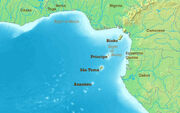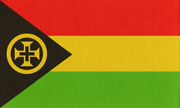| |||
| Capital (and largest city) |
(San Antonio de) Palé | ||
| Language | Portuguese and Fá d'Ambô | ||
| Religion | Roman Catholicism | ||
| Demonym | Ambô, Annobonese | ||
| Government | Traditional republic | ||
| Legislature | Council of Ambô | ||
| President | |||
| Area | 17 km² | ||
| Population | 4500 | ||
| Independence | from Equatorial Guinea, São Tomé | ||
| declared | 1996 | ||
| recognized | 2004 | ||
| Currency | Brazilian real (R$) | ||
| Organizations | Associated state of Brazil | ||
Ambô (Portuguese Ano Bom, Spanish Annobón) is a tiny island in the Gulf of Guinea in free association with Brazil. It was formerly an outlying province of Equatorial Guinea.
Culture
Unlike Bioko and Rio Muni, Ambô never lost the creole culture from Portuguese colonial days. Its small population of 5000 still speaks Fá d'Ambô, a Portuguese creole, and uses standard Portuguese in worship. Spanish has disappeared as the language of officialdom since the island's separation from Equatorial Guinea.
Subsistence farming and fishing remain Ambô's only economic activities. Links with Brazil have resulted in some modest improvements in health care and education, as well as the introduction of some small influences from Brazilian mass culture; but the island has not come close to "modernizing". Rich oil and natural gas deposits are believed to exist offshore. This has made the island strategically important to Brazil and South America as a whole.
History

Map of the Gulf of Guinea
Before 1983
Uninhabited Ambô was colonized by Portugal in the 15th century and settled with a mix of Europeans and slaves imported from São Tomé and Angola. Spain gained possession of the island in 1778 together with the rest of Equitorial Guinea.
Equatorial Guinea became independent in 1968. Its first dictator, Francisco Macías, drove the country into the ground. He abrogated the constitution and drove as much as a third of the population into exile, including most of the people with education and technical knowledge. When he destroyed a large part of the fishing fleet in a vain attempt to keep people from fleeing the country, the little island of Ambô was largely cut off from the rest of the country. A Spanish-backed coup in 1979 put Macías' nephew Teodoro Obiang in charge, but Obiang's policies were not noticeably different from his uncle's.
Effects of the World War
Ambô was absolutely isolated, undemocratic, and poor: it could scarcely have sunk much lower, and the Doomsday event therefore had few immediate effects on the island. The catastrophe prompted Obiang to enact even more heavy-handed policies. Unleashed from any need to please observers abroad, he scrapped the constitution, did away with any pretense of democracy, and ruled the country as his family's private estate.
The war did deprive Obiang of his access to foreign products. Arms were still available from international dealers, but their cost skyrocketed, as did the cost of fuel. Obiang had to find ways of administering his fiefdom with a dwindling supply of modern technology. Obiang was killed in a coup in 1985 and replaced by Lt. Col. Fructuoso Mbá Oñana - but this was strictly a family affair. Mbá, like Macías, was Obiang's uncle, and his administration was no less dictatorial.
Independence Movements
As a minority group variously neglected and persecuted, the Ambô people pushed for independence almost continuously from the mid-80s. A small group in the capital village of San Antonio de Palé captured the governor and declared independence in 1986, only to be crushed by a goon squad from Bioko who shot up the populace and reimposed dictatorial rule.
Another revolt was put down in 1988, as were no fewer than five attempted secessions throughout the 1990s. Ambô separatism remained a continuing problem because the Mbá regime could not afford to maintain a complement of troops on the island. Even sending the detachments to put down the rebellions was quickly becoming unaffordable. Communication with Bioko deteriorated throughout the 1990s; by the end of the decade Mbá and the new governor, Isidoro Eyí Monsui, were exchanging messages less than once a month.
Governor Eyí found his situation increasingly precarious. The cause of Ambô independence had united the entire population against him and his underpaid circle of bodyguards. When leaders of the island's church became independence advocates, worship services were outlawed, with predictable results.
A rumor circulated early in 1996 of an ominous message from Bioko: President Mbá could no longer afford to support the governor. Eyí would have to find some other way to prop up his rule on the island. Most of the guards left the island. Governor Eyí himself soon followed them and was eventually executed in the coup that ousted Mbá; the new regime was not interested in reoccupying the faraway little island. Ambô had finally been let go.
The Village Republic
A council of village elders and religious leaders had already de facto held power in some of the smaller villages for some time. In 1996 they moved into the modest government buildings and drafted an official declaration of independence. A very brief constitution followed, drawn up in Fá d'Ambô creole as well as Portuguese. It largely did away with the Equatoguinean pretensions to modernity, mandating a form of government that was basically democratic but highly traditional, based on community decision making.
Ambô was completely isolated, having received almost no news from the outside world in years. A few outsiders were becoming curious about what was happening on the island. News of the revolution reached São Tomé in 1997. The Portuguese-speaking republic's leaders recognized Ambô's vulnerability and saw an opportunity to distract their people with a war of conquest. Sãotomean ships landed and announced Ambô's annexation. Independence was clearly not to be won easily.
Sãotomean Rule
São Tomé was both closer and less poor than Bioko, so it was much more difficult for Ambô village leaders to defy its government. Fortunately, São Tomé's policies on the island, if undemocratic, were at least not brutal or nasty like those of the Equatoguinean dictators. Ambô separatism did not die, but its activists realized that direct action would not work this time.
While Equatorial Guinea cycled between tyranny and anarchy, the rest of West Africa showed signs of positive development. Some of the newly prosperous nations sent ships to make contact with Ambô and find out what was happening. A ship from Gabon arrived in 1998; Nigeria and the West African Union sent an expedition in 1999; and Cape Verde, associated with the Portuguese remnant government, established contact in 2000.
This remnant government, together with Brazil, invited São Tomé, Guinea-Bissau, and representatives from the People’s Republic of Angola to discuss the creation of a worldwide organization of Portuguese-speaking countries. The talks were inconclusive, but they did raise Brazil's awareness of ongoing human-rights issues in all of these African countries, including the Ambô people's ongoing lack of self-government. At the same time, in 2002 Brazilian explorers found evidence of abundant oil and gas reserves around Ambô. Suddenly, the island was strategically important.
Brazilian Influence
The Brazilian government condemned São Tomé's invasion of Ambô in 2003, hinting that future aid might depend on São Tomé's relinquishing the island. A more strongly worded message in 2004 got results; in just a few years Brazilian aid had become vital to the Sãotomean economy and government. São Tomé relented and recognized Ambô's complete independence, knowing that Brazil would soon be staking its claim. The village republic of 1996 was restored.
Brazilian officials swooped in immediately with an offer of free association, loosely based on the compacts so many Pacific nations had with Australia-New Zealand. Brazil would get exclusive rights to exploit mineral wealth offshore. The Ambô leaders recognized that this amounted to virtual colonization, but it was a better deal than they could get elsewhere. The compact was signed late that year.
The Brazilians established a small embassy in Palé and sponsored some modest but important improvements: a school, a medical clinic, a regular ferry connection to Gabon, and a semi-regular supply ship from Brazil itself. Air travel and other more expensive improvements have been discussed but not planned - these will no doubt have to wait for the development of the oil wells.
Foreign Relations
Ambô is too small to consider membership in the League of Nations. Brazil officially represents its interests there, but to date the little island has rarely come up. Besides Brazil, Ambô interacts diplomatically with Cape Verde and the Portuguese remnant, and with Gabon, Nigeria, and São Tomé. If an international Portuguese-speaking organization were ever to form, Ambô would be an enthusiastic member.
From South America's point of view, Ambô is part of their sphere of influence, a small toehold in Africa. If it ever becomes feasible to exploit the Gulf of Guinea's oil wealth, Ambô will be a very valuable commodity for South America and might position Brazil to develop wells off Bioko, São Tomé, and Principé as well.
Besides the fate of the petroleum deposits, Ambô's biggest foreign policy challenge is the issue of human trafficking. Perpetrated by slavers in small transport boats, the capture and export of small numbers Ambô people has been a persistent problem. Slavers can usually elude both local law enforcement and the occasional Brazilian patrol.
National Symbols
Ambô did not have a consistent flag during its brief first period of independence. The current flag was designed in 2005 by a Cape Verdean artist. The colors are pan-African, arranged in a way to be distinct from other African flags. The design is actually closest to the flag of São Tomé, which also uses a triangle and the colors black, red, green, and yellow; but Ambô's colors are arranged differently, and the symbol at the hoist makes it stand out.
The Order of Christ cross represents the island's Portuguese heritage, which sets it apart from the Hispanophone rest of Equatorial Guinea. The ring around it is said to represent the island itself, as well as "unity" and "eternity." The circle set inside the triangle also suggests Annobón from the air: Lake A Pot set amid the mountains.
Ambô does not produce any of its own currency, but does produce stamps denominated in Brazilian reals. The stamps mostly depict local wildlife and landscapes, but one depicts a Portuguese caravel from the Age of Exploration.

